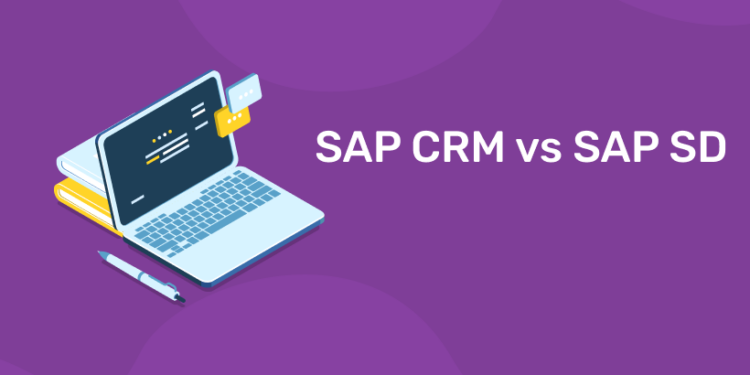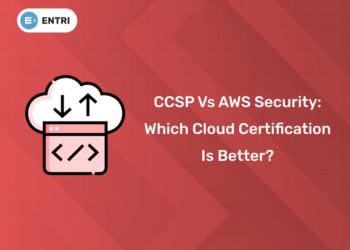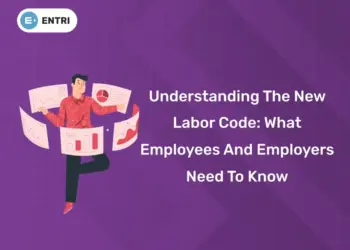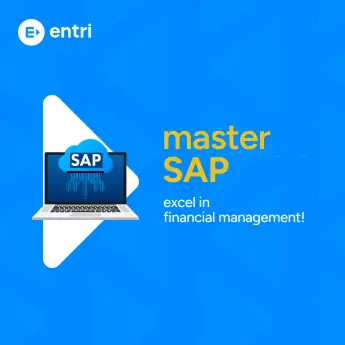Table of Contents
SAP CRM is one of the key modules in an organization that deals with effective and efficient customer handling. In today’s competitive market environment, it is necessary for companies to make changes in a dynamic environment and take care of all the key activities related to customer service.
SAP Customer Relationship Management is known by SAP as an integrated customer relationship management module that helps any organization achieve its business goals and enables it to perform all customer relationship related tasks efficiently. CRM is one of the key components of business strategy creation for medium and large organizations and also helps to effectively understand customers, their needs and customer services.
SAP SD is a module that you can use to store customer and product data. This module is part of the SAP ERP Central Component (ECC) Logistics function and is closely integrated with SAP Material Management (MM) and SAP Production Planning (PP). The SAP SD module contains sub-modules such as supplier and customer database, invoicing, delivery, credit management and invoicing. In collaboration with various SAP SD modules, it runs the order-to-cash business process cycle. Sales and distribution manage all the details that are part of this cycle. In a regular cycle, SD creates a sales quote and customers place an order. After order confirmation, the goods are shipped from the factory or warehouse to the customer’s location. An invoice is also sent along with the order and the accounting team to process the payment. Each step in this process records transactions that lead to further transactions in other modules.
Join to learn SAP SD from the Experts! Click for the demo class!
What are the Key Features of CRM?
Today’s customer relationship management systems include basic CRM functions as well as advanced CRM functions that go far beyond the earlier functions of triaging and storing contacts. Now you can streamline all your customer-facing processes – and strengthen relationships by putting the customer at the center of your sales, marketing, merchandising and service activities.
You expect a CRM system to manage contact, lead and communicate with customers. You also expect analytics and would like automation, but in reality you want everything. And of course you want it to be fully integrated. Good news? Everything is here.
And best-in-class CRM software also offers tools for customer analytics, personalization, social media, collaboration and more.
-
Contact management: Securely store your customer information – including names, contact details, social media accounts and communication preferences – in a central database that your entire team can access in real time 24/7.
-
Interaction management: Track all of your customer interactions—including emails, phone conversations, social media posts, and chat sessions—to get a 360-degree view of each customer and ensure a consistent experience across channels.
-
Lead management: Identify, score and track leads through your pipeline – turn more leads into buyers. With CRM, you can integrate lead generation, pipeline management, and lead nurturing activities.
-
Workflow automation: Automate repetitive manual tasks like entering contact information – and harness the power of built-in AI and machine learning to deliver chatbot-based interactions on social networks and messaging apps.
-
Customer analytics: Display the right insights at the right time with on-demand CRM reports and interactive dashboards. Anticipate what customers want, adapt your environment and take the right action in the moment.
-
CRM integrations: Integrate your CRM system with your web, email and calendar platforms, accounting and invoicing software, customer surveys, document management and electronic signatures all in one place.
-
Secure, mobile CRM: All your CRM features should be available to you anytime, anywhere, from any device. In addition, your cloud CRM should help you streamline your security, data protection and GDPR compliance requirements.
Key Features of SAP SD
Here are some critical features of this module:
- Pricing and Taxation: This feature helps to calculate the cost of the goods or services for the client depending on their requirements and other parameters like the discount or rebate they want to give to the customer. It also helps to calculate the tax as each region where the services are complete may be slightly different.
- Availability Check: The availability check feature helps to check if the product is available at the facility or warehouse. It can also calculate the number of available units of a particular product. Invoicing and Invoicing: This feature also helps generate invoices and create invoices for the customer
- Material determination: This function provides information about the product material.
- Credit Management: The credit management feature helps you manage the credit limits you assign to all customers. This image shows two ways to maintain credit, which are automatic and simple credit checks.
- Account Determination: This feature helps you to find out the type of account based on the given condition.
Master SAP with Expert-Led Courses
Unlock your potential with our comprehensive SAP courses! Learn essential modules like SAP MM (Materials Management), SAP SD (Sales and Distribution), and SAP FICO (Financial Accounting and Controlling) from industry experts.
Know MoreWhat is SAP Sales and Distribution(SD)
The SAP SD module is one of the primary ERP modules developed by SAP. SAP Service and Distribution deals with better management of customer sales and distribution data and processes in organizations. It works closely with other SAP modules for effective work with processes. Other modules that SAP SD integrates are financial accounting (FI), controlling (CO), material management (MM) and production planning (PP) and so on. All of these work together to improve the work process in businesses.
SAP SD configuration requires adequate knowledge of working with software products developed by SAP. Experts widely recommend taking SAP SD training to build a strong foundation as a SAP SD user. The SAP SD module has several components that integrate different processes within a work area.
Components of SAP SD Module
- SAP-SD-MD: Master Data
- SAP-SD-BF: Basic Functions
- SAP-SD-SLS: Sales
- SAP-SD-SHP: Shipping
- SAP-SD-TBA: Transportation
- SAP-SD-FTT: Foreign Trade
- SAP-SD-BIL: Billing
- SAP-SD-CAS: Sales Support
SAP-SD-MD (Master Data)
The SAP SD user includes the master data and the process includes tracking each transaction within the data. Sales and distribution master data includes customer master data, material master data, pricing terms record, output records and credit management. In this module, the entire flow from order to cash processing is recorded.
SAP-SD-BF (Basic Functions)
SAP SD configuration leads to an efficient process across all major sales and distribution functions. Examples of basic functions here might be pricing, output, etc. The amount of price used for a particular sale, and that results in output, and so on.
SAP-SD-SLS (Sales)
As the name suggests, SAP SD Sales handles the fine details of every sale made. From product recording to customer details, pricing, feedback and sales process, everything is tracked through this module.
SAP-SD-SHP (Shipping)
Sales are closely related to shipping and delivery. The product must be properly shipped and delivered to the customer. There are different shipping methods and this module tracks each of them used for each delivery. This module records the entire process from shipment to delivery or return.
SAP-SD-TBA (Transportation)
This SAP SD component works closely with the transport module mentioned above. The product can be delivered by courier or personally. The mode of transport is different for everyone and is tracked through this module.
SAP-SD-FTT (Foreign Trade)
This component helps the department process data related to foreign trade, both imported products and products exported abroad. This module works best for businesses involved in interstate commerce.
SAP-SD-BIL (Billing)
Invoicing is a major part of sales. Customers can pay either online using debit or credit card, cash on delivery or pay pal account and so on. This module records every account detail to keep a proper trail for future reference.
SAP-SD-CAS (Sales Support)
Customers are constantly interacting with the sales team, from selling the product to maintaining it. Data exchanged between the sales team and customers when providing product support is recorded and reported through this module.
These are some of the many components that come with the SAP SD user for an efficient sales and distribution process.
What is SAP CRM
SAP CRM stands for Customer Relationship Management and is a software solution that enables businesses to collect all customer data and related messages, organize it and store it in a comprehensive database. This enables employees to use better analytics and insights to build stronger customer relationships and facilitate a collaborative environment for all parties involved in day-to-day interactions.
SAP CRM consists of several different customer interaction channels and tools designed to help companies optimize operations in customer-facing business areas, including contact, lead, and customer management, to improve collaboration and connectivity across the enterprise. And as part of the SAP Business Suite, SAP CRM enables users to integrate their most important customer-facing processes with other enterprise resource planning (ERP) operations across teams and systems, increasing productivity and efficiency for core analytics, marketing automation and sales processes.
Join to learn SAP SD from the Experts! Click for the demo class!
Key Components of the SAP CRM Module
Let’s take a closer look at the main components of SAP Customer Relationship Management…
1) SAP CRM Sales
SAP CRM for Sales improves opportunities for sales representatives across the enterprise, making it easier for them to make successful connections, automate lead generation, deliver more accurate sales quotes, and create reports to track all sales information.
This software offers real-time visibility into the sales pipeline and enables teams to prioritize opportunities, accurately forecast, make data-driven decisions and close deals faster.
2) SAP CRM Marketing
Marketing CRM enables SAP users to gain better insight into customer behavior and trends across the market and surprise customers with a unique, personalized experience.
SAP CRM enables marketers to segment their target audience, personalize communications and deliver highly targeted messages across multiple channels. In this way, companies can effectively plan, execute and measure marketing campaigns, nurture leads and improve ROI.
3) SAP CRM Service
SAP Service CRM provides the tools needed to keep customers happy even when they seem to expect more than the software can deliver. This enables teams in any industry to automate manual customer service processes and improve customer relationship management initiatives to drive brand loyalty.
SAP CRM for Service uses real-time analytics and reporting to measure service performance, identify areas for improvement, and ensure continuous service excellence across teams and areas of the organization.
4) SAP CRM E-Commerce
E-Commerce CRM provides a set of tools that offer an omnichannel business experience across brick-and-mortar, online and mobile sales processes and improve relationships with high-value customers.
SAP CRM for E-commerce also integrates with various back-end systems such as inventory management and order fulfillment to ensure smooth operations, increase customer satisfaction and manage the entire customer lifecycle.
Integration Between SAP CRM and SAP SD
SAP Customer Relationship Management (CRM) and SAP Sales and Distribution (SD) can be integrated in several ways, including:
- Real-time master data integration
This enables real-time integration of master data such as accounts, contacts, leads and products.
- Integration with Revenue Accounting
This integration runs from CRM to ERP to Revenue Accounting.
- Integration with Convergent Invoicing
This enables the transfer of one-off fees from CRM as billable items to accounting in the ERP system. It also enables the transfer of invoicing documents from SAP CRM to convergent invoicing.
- Sales Product Integration
This enables the creation of a sales order in SD in ECC directly from the sales items in the CRM service order.
- SD CRM Condition Integration
This is a business feature that is available in SAP ERP 6.0 Enhancement Package EhP2005.2.
A CRM is a system that enables the automation and integration of customer data and customer-facing activities such as sales, marketing, service, and e-commerce.
Master SAP with Expert-Led Courses
Unlock your potential with our comprehensive SAP courses! Learn essential modules like SAP MM (Materials Management), SAP SD (Sales and Distribution), and SAP FICO (Financial Accounting and Controlling) from industry experts.
Know MoreSAP CRM Career Opportunities
As SAP CRM is an increasingly used tool in many companies around the world, the demand for SAP CRM professionals around the world is increasing. Those already working in sales and marketing can make a great career in SAP CRM. No doubt freshers make a great career in SAP CRM.
Before diving into a SAP CRM career, it is important that you brush up on your knowledge of the various modules of SAP and ERP systems. Whether you are from engineering or business background – candidates from any stream can start their career in SAP CRM.
If you can get certified in SAP CRM, you will be well on your way to becoming a competent SAP CRM consultant. Once you master SAP CRM, you will get a chance to get hired by top companies like TCS, Capgemini, Infosys, IBM and so on.
SAP SD Career Opportunities
Sales and distribution is a core SAP module so yes SD is a good career choice. SD is widely used in various industries such as manufacturing, insurance, energy, security, telecommunications, pharmaceutical and healthcare. The future of SAP SD consultants is bright as SD consultants are in high demand.
Sales and distribution is a module in SAP Arena that determines the development of requirements, operations and conditions of business processes associated with shipping, packaging, invoicing and delivery of orders. If the candidate is well trained along with certification and knowledge in SAP sales and distribution with project management, he will rank among the top companies offering good packages. SAP SD has increased marketability along with certification, has various networking opportunities, increases earning potential, increases career growth and has a very bright future.
| Also Read | |
|---|---|
| SAP FICO vs SAP MM: Which is Right for You? | SAP SD vs SAP FICO |
| Tally vs SAP | Difference Between SAP FICO and SAP HANA Finance |
| SAP MM vs SAP SD | |
What should You Choose?
In today’s competitive market, individuals must have the right skills and knowledge to advance their careers. One such skill that has become increasingly popular in recent years is SAP SD (Sales and Distribution). There are many complete SAP SD courses available to help individuals gain practical skills to move forward in the sector.
SAP SD is a core module in SAP ERP (enterprise resource planning) and focuses on the core business functions of sales, invoicing, delivery and credit management. As companies automate their operations, the demand for SAP SD experts is growing significantly. Read on to learn about SAP sales and distribution courses and their benefits.
Growing Demand for SAP SD Professionals
The demand for individuals certified in SAP sales and distribution courses has grown steadily over the years, and companies are constantly looking for professionals who can manage various aspects of sales and distribution. By investing your time in the full-length SAP SD course, you will learn the skills needed to become a successful SAP SD consultant, including aspects of sales and distribution, pricing, sales order processing, and invoicing. With these skills, you will be well placed to secure an enviable job at a high-paying company.
Gain Hands-on Experience
Another big advantage of the SAP SD Full course is that you get hands-on experience with SAP software. You will work on real scenarios and projects that will help you understand the software in a practical way. This experience will prove invaluable when you start working in the industry as you will have better experience with a real world situation.
Global Career Prospects
SAP SD is a globally recognized course and will help you get job opportunities in India and other countries. Many international organizations have adopted SAP ERP and are looking for professionals with the right skills. By completing the SAP SD Module training, you can apply for jobs in any part of the world and explore international career prospects.
Enhance Your Knowledge and Skills
By completing the entire SAP SD course, you will gain a deep understanding of sales and distribution processes and the skills needed to manage them. Additionally, the technical skills you gain from this course will help you in other aspects of your career, such as project management and data analysis.
Improve Problem-Solving Skills
SAP SD involves solving complex business processes and technical problems that require a logical and analytical approach to problem solving. Learning SAP SD will help you hone your problem-solving skills and improve your ability to find solutions to complicated problems.
Career Flexibility
SAP SD professionals can work in a variety of industries, including retail and consumer goods – manufacturing and more. As a result, learning SAP SD will give you flexibility in your career path, allowing you to explore different job roles in different industries.
Enhances Decision-Making Skills
SAP SD enables you to make informed decisions quickly by providing real-time analytics and data. As you become proficient in SAP SD software, you will be able to make decisions based on accurate and up-to-date information. It can help you become more effective in your job role and increase your ability to contribute to the success of your company.
Offers Networking Opportunities
Learning SAP Sales and Distribution allows you to network with other professionals, including trainers, consultants and students. Networking can lead to new job opportunities, collaborations and valuable industry insights. It can help you stay on top of industry trends and best practices to increase your chances of success in your job role.
Enrolling in a SAP SD course can open up many opportunities for career advancement. Once you gain the necessary expertise, you can move up the ladder to become a senior consultant or project manager, leading teams and managing SAP SD implementations. It can be helpful in your career and help you stand out from your peers in the industry. SAP SD certification costs vary by skill; you should do your market research and choose the SAP SD certification course that suits you best.
Join Entri’s SAP SD Course and Build Your Career Now !
Master SAP with Expert-Led Courses
Unlock your potential with our comprehensive SAP courses! Learn essential modules like SAP MM (Materials Management), SAP SD (Sales and Distribution), and SAP FICO (Financial Accounting and Controlling) from industry experts.
Know MoreFrequently Asked Questions
Why do you choose SAP as a career?
Is SAP SD a good career?
What are the benefits of SAP SRM?
- It streamlines the purchasing processes between suppliers and companies.
- Elevates purchase quality as well as efficiency.
- It also improves the relationship between the suppliers and companies.
- develop a purchase strategy and smooth out purchase operations.











